上海牛津沪教版六年级(下)同步讲义unit7
- 格式:doc
- 大小:86.50 KB
- 文档页数:15
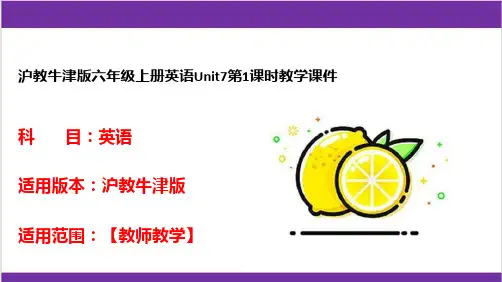
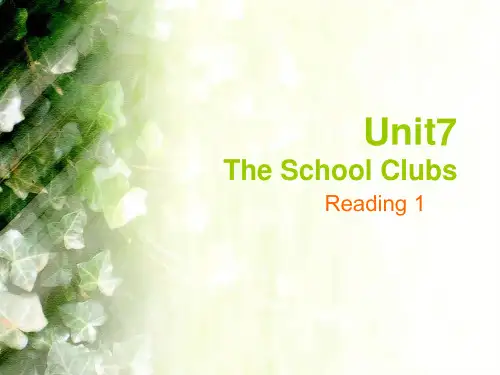
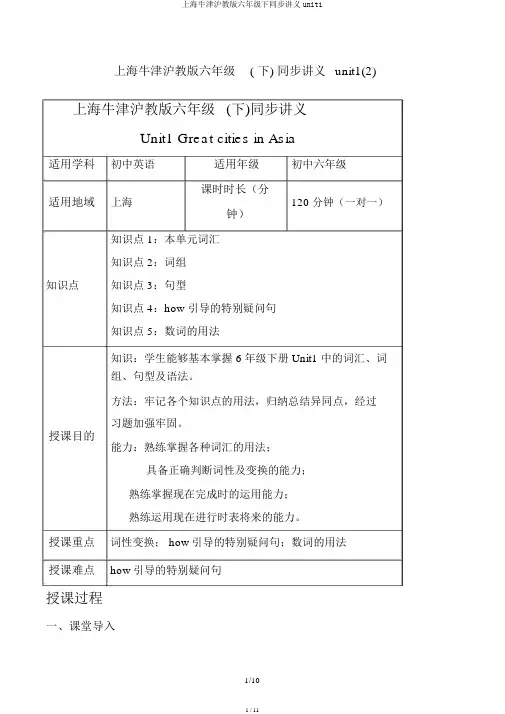
上海牛津沪教版六年级( 下) 同步讲义unit1(2)上海牛津沪教版六年级(下)同步讲义Unit1 Great cities in Asia适用学科初中英语适用年级初中六年级适用地域上海课时时长(分120 分钟(一对一)钟)知识点 1:本单元词汇知识点 2:词组知识点知识点 3:句型知识点 4:how 引导的特别疑问句知识点 5:数词的用法知识:学生能够基本掌握 6年级下册 Unit1 中的词汇、词组、句型及语法。
方法:牢记各个知识点的用法,归纳总结异同点,经过习题加强牢固。
授课目的能力:熟练掌握各种词汇的用法;具备正确判断词性及变换的能力;熟练掌握现在完成时的运用能力;熟练运用现在进行时表将来的能力。
授课重点词性变换; how引导的特别疑问句;数词的用法授课难点how引导的特别疑问句授课过程一、课堂导入教师表达一个与本节课题目有关的英文小故事,引出今日所要讲解的知识点,尔后让学生简单梳理一下所涉及的问题,带着问题学习本节课的内容。
二、复习预习教师引导学生复习上节课学的重点内容,检测单词的用法,(以提问、回顾的形式进行),针对上节课的作业进行讲评、校订、答疑,并经过英文小故事导入本节课所要学习的新知识。
三、知识讲解1.知识点一:重点单词1)Asia [ 'ei??]【词性】n.【词义】亚洲【易混淆点】Asian 亚洲的;亚洲人【经典例句】Miss Guo and her students are at an exhibition about great cities in Asia.郭女士和她的学生们在一个关于亚洲主要城市的展览会上。
2)Japan [d??'p?n]【词性】n.【词义】日本【易混淆点】Japanese日本的;日自己【经典例句】Tokyo is the capital of Japan.东京是日本的国都。
3)Thailand [ 'tail?nd]【词性】n.【词义】泰国【易混淆点】Thai 泰国的;泰国人【经典例句】Bangkok is the capital of Thailand.曼谷是泰国的国都。
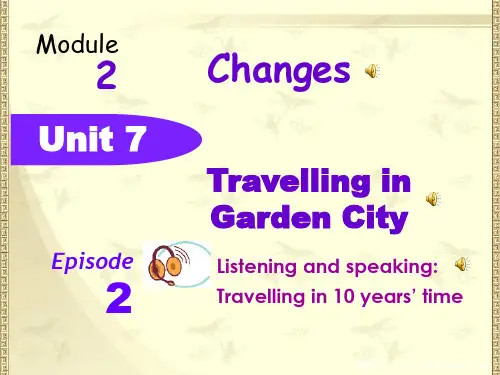
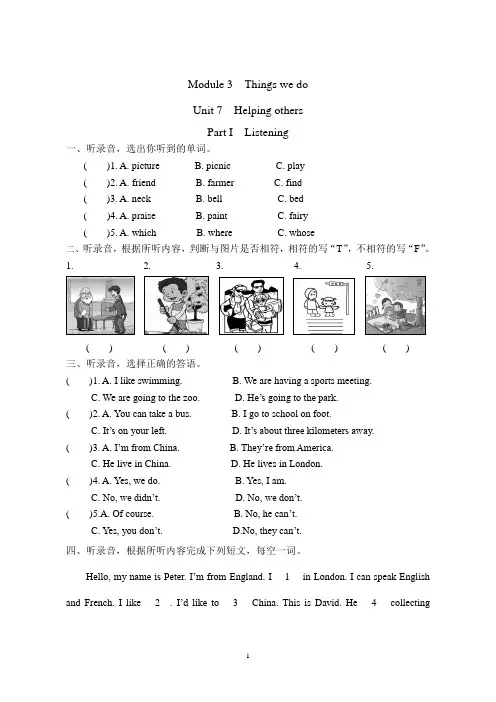
Module 3 Things we doUnit 7 Helping othersPart I Listening一、听录音,选出你听到的单词。
( )1. A. picture B. picnic C. play( )2. A. friend B. farmer C. find( )3. A. neck B. bell C. bed( )4. A. praise B. paint C. fairy( )5. A. which B. where C. whose二、听录音,根据所听内容,判断与图片是否相符,相符的写“T”,不相符的写“F”。
1. 2. 3. 4. 5.( ) ( ) ( ) ( ) ( )三、听录音,选择正确的答语。
( )1. A. I like swimming. B. We are having a sports meeting.C. We are going to the zoo.D. He’s going to the park.( )2. A. You can take a bus. B. I go to school on foot.C. It’s on your left.D. It’s about three kilometers away.( )3. A. I’m from China. B. They’re from America.C. He live in China.D. He lives in London.( )4. A. Yes, we do. B. Yes, I am.C. No, we didn’t.D. No, we don’t.( )5.A. Of course. B. No, he can’t.C. Yes, you don’t.D.No, they can’t.四、听录音,根据所听内容完成下列短文,每空一词。
Hello, my name is Peter. I’m from England. I __1__ in London. I can speak English and French. I like __2__. I’d like to __3__ China. This is David. He __4__ collectingstamps. David and I are from the __5__ country. We’re good friends.1. ________2. _________3. _________4. _________5. _________Part II Reading and Writing五、汉译英。
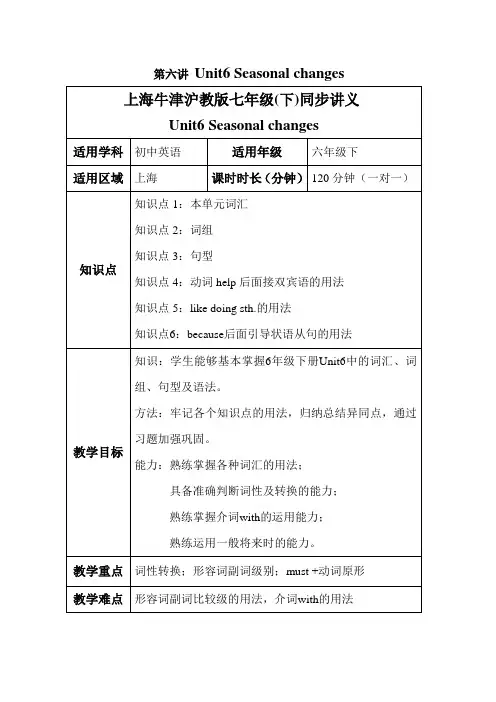
第六讲Unit6 Seasonal changes教学过程一、课堂导入教师讲述一个与本节课题目有关的英文小故事,引出今日所要讲解的知识点,然后让学生简单梳理一下所涉及的问题,带着问题学习本节课的内容。
二、复习预习教师引导学生复习上节课学的重点内容,检测单词的用法,(以提问、回顾的形式进行),针对上节课的作业进行讲评、订正、答疑,并通过英文小故事导入本节课所要学习的新知识。
三、知识讲解1. 知识点一:重点单词1)seasonal [ 'si:zənl]【词性】adj.【词义】季节性的【易混淆点】season n.季节【经典例句】Seasonal changes.季节变化。
2)change [tʃeindʒ]【词性】v.【词义】改变,变化【易混淆点】changeable adj.可变的,多变的【经典例句】You should change your mind.你应该改变你想法。
3)shorts [ʃɔ:ts]【词性】n.【词义】短裤【易混淆点】short adj.短的,矮的【经典例句】Boys must wear white shirts with the short sleeves, blue shorts, black belts, white socks and black shoes.男生必须穿短袖的白衬衫,蓝色的短裤,黑色的腰带,白色短袜和黑色皮鞋。
4)notice [ 'nəutis]【词性1】v.【词义1】注意到【词性2】n.【词义2】告示【经典例句】Miss Guo is writing a notice to all new students about their uniforms in winter.郭小姐正在写一个给所有学生关于他们冬天的校服的告示。
5)belt [belt]【词义】腰带【经典例句】Girls must wear white dresses with the short sleeves, blue belts, white socks and black shoes.女孩们必须穿短袖的连衣裙蓝色腰带,白色短袜和黑色的皮鞋。
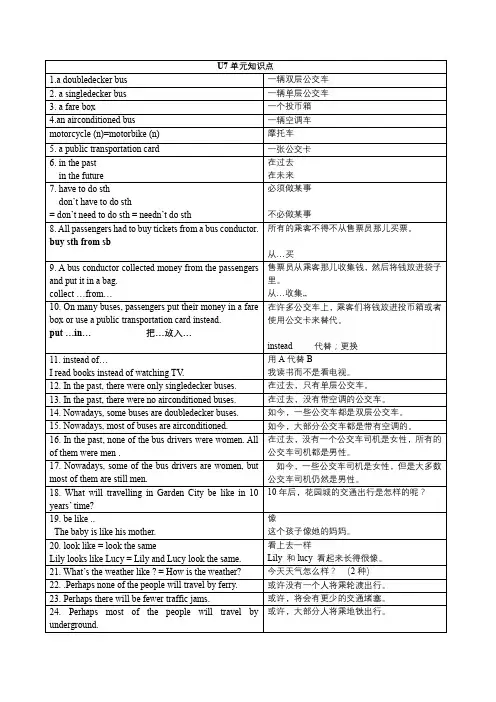
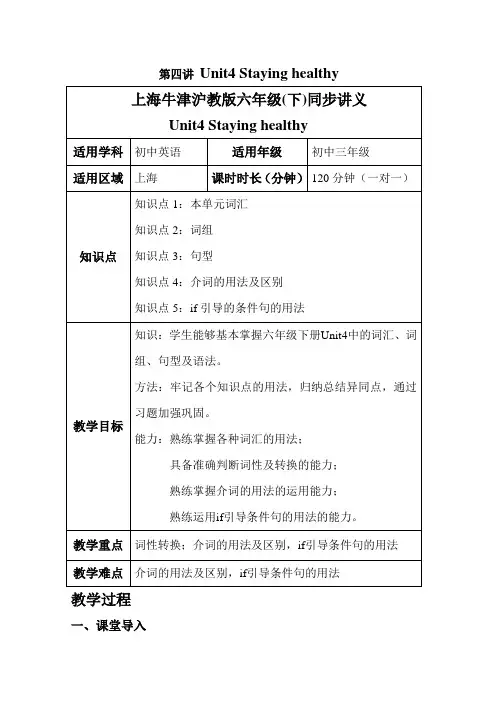
第四讲Unit4 Staying healthy教学过程一、课堂导入教师讲述一个与本节课题目有关的英文小故事,引出今日所要讲解的知识点,然后让学生简单梳理一下所涉及的问题,带着问题学习本节课的内容。
二、复习预习教师引导学生复习上节课学的重点内容,检测单词的用法,(以提问、回顾的形式进行),针对上节课的作业进行讲评、订正、答疑,并通过英文小故事导入本节课所要学习的新知识。
三、知识讲解1. 知识点一:重点单词1)indoor ['ɪndɔː]【词性】adj.【词义】室内的,户内的【易混淆点】inside adj. 内部的,里面的【经典例句】There is a big indoor swimming pool in this hotel.这家旅馆内有一个大的室内游泳馆。
2)outdoor ['aʊtdɔː]【词性】adj.【词义】室外的,户外的【易混淆点】outside adj.外部的,在外面的【经典例句】They needed the outside help.他们需要来自外界的帮助。
3)really ['riːəli]【词性】adv.【词义】真正地,的确【易混淆点】surely adv.真正地【经典例句】I really care about the students in my class.我的确喜欢这个班里的学生。
4)forget [fə'get]【词性】v.【词义】忘记【易混淆点】remember n.记的【经典例句】You'd better forget for the moment.你最好暂时忘掉吧。
5)playground [ 'pleigraʊnd ]【词性】n.【词义】操场【易混淆点】field n.场地【经典例句】The city has several playgrounds for children.这座城市有好几个儿童游乐场。
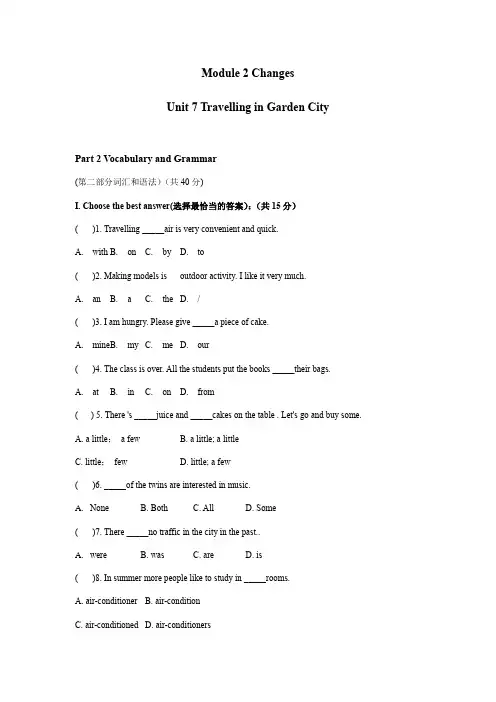
Module 2 ChangesUnit 7 Travelling in Garden CityPart 2 Vocabulary and Grammar(第二部分词汇和语法)(共40分)I. Choose the best answer(选择最恰当的答案):(共15分)()1. Travelling _____air is very convenient and quick.A.withB.onC.byD.to()2. Making models is outdoor activity. I like it very much.A.anB.aC.theD./()3. I am hungry. Please give _____a piece of cake.A.mineB.myC.meD.our()4. The class is over. All the students put the books _____their bags.A.atB.inC.onD.from( ) 5. There 's _____juice and _____cakes on the table . Let's go and buy some.A. a little;a fewB. a little; a littleC. little;fewD. little; a few()6. _____of the twins are interested in music.A.NoneB. BothC. AllD. Some()7. There _____no traffic in the city in the past..A.wereB. wasC. areD. is()8. In summer more people like to study in _____rooms.A. air-conditionerB. air-conditionC. air-conditionedD. air-conditioners()9. Nowadays passengers on the bus put their money in a fare box_____A.eitherB. tooC. yetD. instead()10.——Must I finish writing the composition this afternoon?—No, you_____. You may finish it in the evening.A. doesn’tB. mustn’tC. can’tD. needn’t()11. We must stop______ the water, the land and the air.A. polluteB. to polluteC. pollutingD. to polluting()12. Perhaps people will travel by spaceship in the future. The underlined word means ______.A. may beB. mayC. possibleD. possibly()13. Danny does well in cycling. The underlined part means “______”.A. be good atB. are good atC. is good atD. was good at()14. — Must we start right now?—________You can leave at 8:00.A. Yes, you must.B. No,you mustn’t.C. Pm afraid you must.D. No,you needn’t.()15. 一May I speak to Linda?---____________A. No, you may not.B. Speaking. Who are you?C. This is Linda. Who is that?D. I’m Linda.II. Complete the sentences with the given words in their proper forms (用括号内所给单词的适当形式完成下列句子):(共6分)1.It is _____for us to swim in the deep river, (danger)2.Ken’s mother was a_____ ten years ago. (conduct)3.The policeman asked the old man,“Why do you look so_____?" (worry)4.We shall go to Hong Kong during the Spring Festival. (travel)5.Perhaps there will be_____ air pollution in the future than now. (little)6.I’d like to buy the red shorts. I don't want the blue_____. (one)7.People mustn’t_____the street when the traffic lights are red. (crossing)8.What do you _____do at weekends? (usual)9.I enjoy_____in the countryside, (cycle)10.There are _____students in our class than in your class, (few)I. Rewrite the following sentences as required(根据所给要求,改写下列句子。
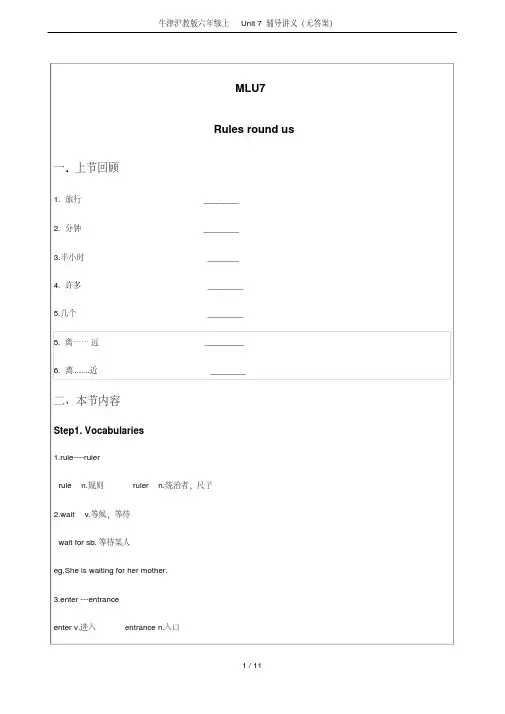
MLU7Rules round us一. 上节回顾1. 旅行________2. 分钟________3.半小时_______4. 许多________5.几个________5. 离……远_________6. 离.......近________二、本节内容Step1. Vocabularies1.rule----rulerrule n.规则ruler n.统治者,尺子2.wait v.等候,等待wait for sb.等待某人eg,She is waiting for her mother.3.enter ---entranceenter v.进入entrance n.入口4.mean-meaning-meaningfulmean v.表示...的意思mean to do sth, 打算做某事eg,He means to play basketball.meaning n.意义,含义,目的meaningful adj.有意义的5.centre---centralcentre n.中心central adj. 中心的Step2 Expressionson the road 在路上on the left/right 在左边/右边leave rubbish 扔垃圾keep quiet 保持安静turn right/left 向右转,向左转Go upstairs 上楼Be late for 迟到Chase each other 互相追逐☆用所给单词的适当形式填空1.Look! My cousin (wait)for us in front of the door.2 (not enter)that empty hall!3.There are many traffic (rule) on the road.4.What is the ____________ (mean) of this word?5.There are a lot of people at the museum_____________ ( enter)Step3 Grammar1. 情态动词:must/mustn't…★must / mustn’t 必须/不允许,表示义务和禁止,后面需跟动词原形,We must keep quiet in the library. 在图书馆我们必须保持安静。
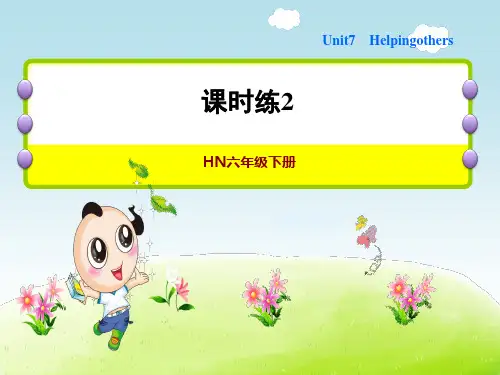
6B Unit 7 Exercise 1班级姓名学号ⅠMatch( ) 1. a double-decker/ single-decker bus A. 没有学生( ) 2. use a public transportation card B. 一些男孩( ) 3. a fare box C. 从乘客那儿收钱( ) 4. an air-conditioned bus D. 大部分女生( ) 5. none of the students E. 空调公交车( ) 6. some of the boys F. 投币箱( ) 7. most of the girls G. 使用公交卡( ) 8. all of us H. 双/单层巴士( ) 9. collect money from the passengers I. 我们都ⅡRewrite the sentences as required1. Mum put her purse(钱包) into the bag. (划线提问)__________ _________ Mum put into the bag?2. There are many air-conditioned buses in our city. (句意相近)There are _____ ________ _______ air-conditioned buses in our city.3. Passengers needn’t buy tickets. (句意相近)Passengers _______ ________ ________ buy tickets.4. None of us were late for school this morning. (句意相近)________ _______ us arrived at school early this morning.5. They must study hard. (句意相近)They _______ ________ study hard.ⅢChoice( ) 1. The bus is _________.A. air-conditionB. air-conditionalC. air-conditionerD. air-conditioned ( ) 2. He used his public transportation card _______.A. to insteadB. instead ofC. insteadD. instead for ( ) 3. ________, people liked traveling by train.A .For the past B. From the past C. To the past D. In the past ( ) 4. – Do you know the results of the Maths test?-- Yes. It is very easy. _______ us have failed. We are all happy.A. None ofB. Some ofC. Most ofD. All of( ) 5. Children, _________ you have finished the work. None of you lost.A. None of B Some of C. Most of D. All ofⅣFill in the blanks with proper prepositions1. Some people go to work ______ bus, others go to work ______ foot.2. The passengers had to buy tickets ______ the bus conductor.3. The old man collects rubbish _______ the people in the estate every day.4. She watches TV instead ______ doing her homework at weekends.6B Unit 7 Exercise 2班级姓名学号ⅠMatch( ) 1. in ten years’ time A. 一座人行桥( ) 2. Our school is like a garden. B. 一辆摩托车( ) 3. traffic jam C. 斑马线( ) 4. light rail D. 轻轨( ) 5. a motorcycle E. 很多高架桥( ) 6. a lot of flyovers F. 交通堵塞( ) 7. a footbridge G. 我们的学校像个花园( ) 8. zebra crossing H. 十年以后ⅡChoose the proper word to complete the sentences1. My father is in Hangzhou. He will come back (after, in) two days.2. Don’t leave. We will be back in ten (minutes, minutes’) time.3. Those (butterflys, butterflies ) are beautiful.4. (None of, All of) us like soft drinks. We never drink them.5. Don’t walk there. Please walk (in, on) the pavement.6. My car can’t move. There is (a traffic jam, traffic jam) here.7. There is (a little, a few) jam in the bottle.8. Please (cross, crossing) the road when the traffic light is green.9. We can see some (footbridge, footbridges) along the street.10. Perhaps I will be a teacher in 10 (year’s, years’) time.11. There are (fewer, more) cars in our city nowadays.ⅢRewrite the sentences as required1. Mary looks like her mother.(划线提问)______ does Mary look like?2. Ben will come back at four o’clock. (划线提问)_______ ________ Ben come back?3. Jim went to Nanjing by train. (句意相近)Jim ______ a train to Nanjing.4. The traffic light is red. You must stop. (连成一句话)You must stop _______ the traffic light is red.5. Maybe it will get warmer and warmer in the future. (句意相近)__________ it will get warmer and warmer in the future.6. All of the teachers are friendly to the students. (句意相反)_______ ______ the teachers are friendly to the students.7. Some people still like to travel by train because it is cheap. (划线提问) ______ ______ some people still like to travel by train?8. People will build more footbridges in Shanghai. (划线提问)_______ _______ people build in Shanghai?6B Unit 7 Exercise 3班级姓名学号ⅠComplete the sentences with the given words in their proper form1. The meeting room is ________________. It is cool to stay in it. (air-conditioner)2. Trains are much faster than _________.(bus)3. __________ of the students are girls. Only a few of them are boys.(many)4. You made _________ mistakes in your homework than before.(few)5. Alice is a _________. She likes __________. (dance)ⅡChoice( )1. ________ air-conditioner in our classroom doesn’t work.A. AB. aC. TheD. /( )2. – He will come, I’m not sure.-- ________.A. MayB. May beC. MaybeD. Possible ( )3. I watched three films last month. But ________ of them is interesting.A. NoneB. allC. mostD. both( )4. There are only two _______ in this office.A. man doctorsB. men doctorC. men doctorsD. mans doctors ( )5. Tom will be taller and stronger _________.A. in ten year’sB. in ten years timeC. in ten years’s timeD. in ten years’ time( )6. There is _____ water pollution than twenty years ago.A. manyB. muchC. moreD. fewer( )7. – Excuse me, but how can I get to the nearest post office?-- It’s on Huaihai Road. You can go there ______.A. by trainB. by a busC. by busD. by the bus ( )8. – Do you like traveling around the world.-- Yes, ______.A. I likeB. I likesC. I doD. I don’t.ⅢRewrite the sentences as required1. They are going to get there by underground.(划线提问)_______ _______ they going to get there?2. Peter studies Japanese at school.(改为否定)Peter ________ ________ Japanese at school.3. Shanghai will be more beautiful in the future. (划线提问)______ _______ Shanghai be _______ in the future?4. He walks to school every morning.(保持愿意)He goes to school _______ _______ every morning.5. Alice often goes shopping with her friend at weekends. (划线提问)_______ does Alice often ________ with her friend at weekends?6B Unit 7 Exercise 4ⅠChoose the proper word to complete the sentences1. I like (cycle, cycling).2. (Both, All) of my parents are teachers.3. She didn’t buy any apples. (Instead, Instead of) , she bought some oranges.4. There are (fewer, less) students in our class than your class.5. (Maybe, May be) what you said is right.ⅡChoice( )1. I always do my homework ____ Sunday mornings.A. onB. inC. atD. to( )2. I’d rather _____ at home and watch DVDs.A. stayB. stayingC. staysD. to stay ( )3. – Did your mother _____ to the market every Sunday?-- Yes, she ______.A . went; went B. go; go C. go; does D. go; did ( )4. There isn’t _______ traffic in the suburbs(郊区).A . many B. much C. few D. little( )5. Can you help me make a poster about what traveling _____ in 10 years’ time.A. likedB. likesC. will likeD. will be likeⅢRewrite the sentences as required1. The dog ran away. (否定句)The dog ______ ______ away.2. The weather will be sunny tomorrow.(划线提问)_______ will the weather be ________ tomorrow?3. I had a shower (淋浴) yesterday. I didn’t have a bath. (保持原意)I had a shower ________ ______ a bath yesterday.4. All of the lessons are very interesting. (否定句)______ of the lessons _____ interesting.5. She went to Beijing by plane last month. (保持原意)She ______ a plane ______ Beijing last month.ⅣTranslation1. 许多人喜欢乘车出行。
上海牛津沪教版六年级(下)同步讲义unit11第十一讲Unit11Controlling fire上海牛津沪教版六年级(下)同步讲义Unit11Controlling fire适用学科初中英语适用年级初中三年级适用区域上海课时时长(分钟)120分钟(一对一)知识点知识点1:本单元词汇知识点2:词组知识点3:句型知识点4:情态动词may,must的用法知识点5:There be句型知识点6:表地点的介词和序数词用法教学目标知识:学生能够基本掌握六年级上册Unit11中的词汇、词组、句型及语法。
方法:牢记各个知识点的用法,归纳总结异同点,通过习题加强巩固。
能力:熟练掌握各种词汇的用法;具备准确判断词性及转换的能力;熟练掌握情态动词may,must的用法熟练运用There be句型教学重点表地点的介词和序数词用法教学难点情态动词may,must的用法教学过程一、课堂导入教师讲述一个与本节课题目有关的英文小故事,引出今日所要讲解的知识点,然后让学生简单梳理一下所涉及的问题,带着问题学习本节课的内容。
二、复习预习教师引导学生复习上节课学的重点内容,检测单词的用法,(以提问、回顾的形式进行),针对上节课的作业进行讲评、订正、答疑,并通过英文小故事导入本节课所要学习的新知识。
三、知识讲解1. 知识点一:重点单词1)control [k?n'tr??l]【词性】v.【词义】控制,抑制【易混淆点】in control of 控制…in the control of 被…控制【经典例句】The pilot lost the control of the plane.飞机失去了对飞机的控制。
2)cigarette [?siɡ??ret]【词性】n.【词义】香烟【易混淆点】cigarette n. 香烟cigar n. 雪茄【经典例句】We should be careful with the cigarette ends.我们应该小心烟蒂。
第七讲Unit7 Travelling in Garden City上海牛津沪教版六年级(下)同步讲义Unit7 Travelling in Garden City适用学科初中英语适用年级初中六年级适用区域上海课时时长(分钟)120分钟(一对一)知识点知识点1:本单元词汇知识点2:词组知识点3:句型知识点4:不定代词的用法知识点5:形容词比较级知识点6:一般将来时态教学目标知识:学生能够基本掌握6年级下册Unit7中的词汇、词组、句型及语法。
方法:牢记各个知识点的用法,归纳总结异同点,通过习题加强巩固。
能力:熟练掌握各种词汇的用法;具备准确判断词性及转换的能力;熟练掌握形容词比较级的运用能力;熟练运用一般将来时和不定代词的能力。
教学重点词性转换;形容词比较级;不定代词用法教学难点形容词比较级用法教学过程一、课堂导入教师讲述一个与本节课题目有关的英文小故事,引出今日所要讲解的知识点,然后让学生简单梳理一下所涉及的问题,带着问题学习本节课的内容。
二、复习预习教师引导学生复习上节课学的重点内容,检测单词的用法,(以提问、回顾的形式进行),针对上节课的作业进行讲评、订正、答疑,并通过英文小故事导入本节课所要学习的新知识。
三、知识讲解1. 知识点一:重点单词1)fare [feə]【词性】n.【词义】车费;乘客;伙食【易混淆点】fee n.服务费【经典例句】They put their money in a fare box他们把他们的钱投进投币箱。
2)public ['pʌblɪk]【词性】adj.【词义】公共的;公众的【易混淆点】in public:公开地;当众的in the public:公众【经典例句】They put their money in a fare box or use a public transportation card instead.他们把钱投进投币箱或使用公共交通卡。
3)instead [ɪn'sted]【词性】adv.【词义】代替;更换【易混淆点】instead of:后接名词或动名词短语,代替。
instead:用于句中或句末,取而代之。
【经典例句】They put their money in a fare box or use a public transportation card instead.他们把钱投进投币箱或使用公共交通卡。
4)conductor [kən'dʌktə]【词性】n.【词义】售票员【经典例句】In the past,all passengers had to buy tickets from a bus conductor.过去,所有乘客必须从售票员那里买票。
5)perhaps [pə'hæps]【词性】adv.【词义】也许,大概,可能【易混淆点】maybepossiblyprobably【经典例句】Perhaps there will be fewer traffic jams.也许以后交通不会那么拥挤了。
6)discuss [dis'kʌs]【词性】v.【词义】商量,讨论【经典例句】And then discuss them with your classmates.然后和你的同班同学进行讨论。
7)travel ['trævl]【词性】v.【词义】旅游【易混淆点】tour :短途旅行journey:长途旅行trip:旅行总称【经典例句】Many people like travelling by bus.很多人喜欢乘公车旅行。
8)air-conditioned [ɛə, kən'diʃənd]【词性】adj.【词义】装有空调的【经典例句】In the past,there were no air-conditioned buses.过去没有配有空调的公交车。
9)transportation [ˌtrænspɔ:'teiʃən]【词性】n.【词义】交通;运输【易混淆点】traffic 交通,车辆;不可数名词【经典例句】They put their money in a fare box or use a public transportation card instead.他们把钱投进投币箱或使用公共交通卡。
10)still [stɪl]【词性】adv.【词义】仍然;依旧;还是【经典例句】Nowadays,but most of them are still men.如今,他们当中大多数仍然是男性。
11)few[fjuː]【词性】adj.【词义】很少的,不多的【易混淆点】a few:有一些,表达肯定意义。
【经典例句】Perhaps there will be fewer traffic jams.也许以后交通不会那么拥挤了。
2. 知识点二:重点词组traveling in Garden City 花园城的出行travelling by bus∕ferry∕underground 乘公共汽车/渡船/地铁出行a single-decker bus 一辆单层汽车a double-decker bus 一辆双层汽车a fare box 一个投币箱a public transportation card 一张公共交通卡an air-conditioned bus 一辆空调车in the past 在过去in 10 years’ time 十年后all passengers 所有的乘客buy tickets from 从……买票collect money from the passengers 从乘客那里收钱have to do sth.(don’t have to do sth.) 不得不;必须(不必)put their money in a fare box 把钱放进投币箱use sth. instead 用……替代all of 全部的……most of 大部分的……some of 一些……none of 没有一个……be like 像……fewer traffic jams 少一些交通阻塞more underground stations 更多的地铁站light rail 轻轨traffic lights 交通灯car parks 停车场discuss sth. with sb. 和…讨论*think about 考虑;思考;想一想*kinds of transport 交通方式*make a poster about 制作一张有关……的海报3. 知识点三:重点句型1)What will travelling in our city be like in 10 years’ time?十年后我们城市的旅行是怎么样的?2)In the past, all passengers had to buy tickets from a bus conductor.过去,所有乘客必须从公交售票员那里买票。
3)They put their money in a fare box or use a public transportation card instead.他们把钱投进投币箱或使用公共交通卡。
4)Perhaps none of the people will travel by ferry.也许没有人会乘船旅行。
5)Perhaps there will be more underground station.也许将有更多地铁站。
6)Perhaps most of the people will travel by underground.也许大多数人将乘地铁旅行。
7)Nowadays,but most of them are still men.如今,他们当中大多数仍然是男性。
4. 知识点四:常见语法1)形容词的比较级①规则变化单音节词在词尾比较级加- er或最高级加- estcheap-cheaper, cold-colder, small-smaller以e结尾的词,只需加-r 或-stfine-finer,safe-safer,nice-nicer以辅音字母加y 结尾双音节词变y 为i 加–er 或–est happy-happier, busy-busier重读闭音节、末尾只有一个辅音字母双写加–er 或–est fat-fatter, hot-hotter部分双音节和多音节词在原级前加more 或mostbeautiful-more beautiful②不规则变化many/much—more;little—less;bad/badly/ill-worsefar-farther/further;old-older/elder;good/well-bettere.g. Perhaps there will be more underground station.也许将有更多地铁站。
③句型形容词比较级… than…more and more…比较级and 比较级the+比较级;the+比较级2)不定代词用法none,all,some,few,manynone:三者或三者以上,既可指人,也可指物。
常可构成none of…;后面谓语动词既可以用单也可以用复数,但是如果后面接的是不可数名词,谓语动词必须用单数。
e.g. None of the money is mine.没有一分钱是我的。
e.g. None of them like/likes it.他们中没有人喜欢它。
all:三者或三者以上,既可指人,也可指物。
常可构成all of…;后面谓语动词单复数取决于名词的单复数。
e.g. Perhaps all of the people will travel by bus.也许所有人都会乘公车旅行。
some:一些,既可指人,也可指物,既可以修饰可数名词复数,也可以修饰不可数名词。
谓语动词单复数取决于后面的名词。
e.g. Perhaps some of the people will travel by bus.也许有些人会乘公车旅行。
most:大多数,既可指人,也可指物,谓语动词一般用复数。
e.g. Perhaps most of the people will travel by bus.也许大多数人会乘公车旅行。
3)一般将来时用法结构:be going to/will+动词原形(第一人称时可以用shall)时间状语:tomorrow,soon,tonight,the day after tomorrowthis coming …,in the near future,in an hour,next…e.g. What will travelling in our city be like in 10 years’ time?十年后我们城市的旅行是怎么样的?4)there be 句型表示事物的存在,在什么地方有什么一般现在时:There is∕are一般过去时:There was∕were一般将来时:There will be/ There is going to be四、例题精析【例题1】【题干】None of the bread ______ delicious.A. tastesB. tasteC. will tasteD. are tasting 【答案】B【解析】本题考查主谓一致。